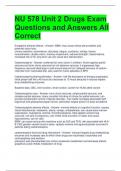NU 578 Unit 2 Drugs Exam
Questions and Answers All
Correct
Exogabine adverse effects - Answer- BBW: may cause retinal abnormalities and
potential vision loss.
urinary retention, somnolence, dizziness, fatigue, confusion, vertigo, tremor,
incoordination, double vision, memory impairment, reduced strength, hallucinations,
increased risk of SI. long term use can cause skin discoloration.
Carbamazepine - Answer- preferred for tonic clonic in children. Active against partial
seizures and tonic clonic seizures but not absence seizures. it suppresses high
frequency neuronal discharge in and around seizure foci. delayed recovery of sodium
channels from inactivated site. also used for manic episodes in BPD
Carbamazepine pharmacokinetics - Answer- half life decreases as therapy progresses.
initial phase half life is 40 hours but decrease to 15 hours because it induces hepatic
drug metabolizing enzymes.
Baseline data: CBC, liver function, renal function, screen for HLAb allele variant
Carbamazepine uses - Answer- tonic clonic seizures, simple partial seizures, and
complex partial seizures. many consider first drug of choice for partial seizures. can
provide symptomatic control in bipolar disorder.. can reside neuralgia associated with
trigeminal and glossopharyngeal nerves. administer largest portion of dose at bedtime
Carbamazepine adverse effects - Answer- minimal effects on cognitive function. causes
visual disturbances, headache, ataxia, vertigo, unsteadiness. can cause bone marrow
suppression, leukopenia, anemia, thrombocytopenia. fatal aplastic anemia has
occurred. not safe in pregnancy. can inhibit renal excretion of water and cause
hyponatremia. can for rash.
BBW: can cause serous skin reactions such as SJS and TEN. risk associated with HLA-
B 1502 genetic variant found in asian. aplastic anemia and agranulocytosis occurred in
patients taking carbamazepine.
carbamazepine food and drug interactions - Answer- induced hepatic drug metabolizing
enzymes and increases rate at which other drugs are inactivated. inactivates oral
contraceptives and warfarin.
phenytoin and phenobarbital can further accelerate metabolism and decrease effects.
grapefruit juicee inhibits metabolism of drug.
, Valproic Acid - Answer- Anticonvulsant for all partial and generalized seizure types,
bipolar disorder, and migraine headaches.
it augments the inhibitory influence of GABA or increases GABA concentration in the
brain.
Therapeutic response at 50-100 ug/ml
need liver function prior to screening.
Valproic acid adverse effects - Answer- causes minimal sedation and cognitive
impairment. GI effects most common. rash, weight gain, hair loss, tremor, blood
dyscrasias.Hepatotoxicity and pancreatitis are rare but serious
BBW: fatal hepatic failure has occurred. fatal pancreatitis has occurred (nausea,
vomitting, anorexia, abdominal pain). highly teratogenic.
valrpoic acid drug interactions - Answer- decreases metabolism of phenobarbital. can
displace phenytoin from binding sites of plasma proteins and cause toxicity. can cause
hyperammonemia with topiramate. carbapenem abx can decrease effect of drug and
cause breakthrough seizures.
Gabapentin - Answer- analog of GABA but does not directly affect receptors. may
enhance GABA release and increase inhibition of neuronal firing. Used for adjunct
therapy of partial seizures, postherpetic neuralgia. off label for diabetic neuropathy,
prophylaxis migraine, treatment of fibromyalgia, RLS, alcohol withdrawal, hiccups,
chronic cough. Gapapentin ER for posttherpetic neuralgia and gabapentin enacarbil for
RLS.
gabapentin adverse effects - Answer- somnolence, dizziness, ataxia, fatigue,
nystagmus, peripheral edema. avoid driving and other activities untill confident they are
not impaired. not influenced by hepatic metabolizing enzymes so well suited to be
combined.
Baseline data: renal function
Pregabalin - Answer- analog of GABA. does not bind with GABA receptor. can bind with
calcium channels on nerve terminal sand can inhibit calcium influx which can inhibit
release of neurotransmitters. Used for neuropathic pain associated with diabetic
neuropathy, postherpetic neuralgia, adjunctive therapy of patella seizures, fibromyalgia.
pregabalin adverse effects - Answer- dizziness, somnolence, blurred vision, weight
gain, difficulty thinking, headache, peripheral edema, dry mouth. risk of angioedema
and rnhabdomylosis.




